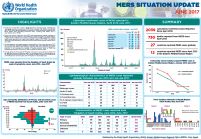 Read the situation update for July 2019At the end of July 2019, a total of 2458 laboratory-confirmed cases of Middle East respiratory syndrome (MERS), including 848 associated deaths (case-fatality rate: 34.49%) were reported globally; the majority of these cases were reported from Saudi Arabia (2067 cases, including 770 related deaths with a case–fatality rate of 37.25%).
Read the situation update for July 2019At the end of July 2019, a total of 2458 laboratory-confirmed cases of Middle East respiratory syndrome (MERS), including 848 associated deaths (case-fatality rate: 34.49%) were reported globally; the majority of these cases were reported from Saudi Arabia (2067 cases, including 770 related deaths with a case–fatality rate of 37.25%).- During the month of July, a total of 9 laboratory-confirmed cases of MERS were reported globally. All the 9 cases were reported from Saudi Arabia with 3 associated deaths. 2 of the cases reported had their the symptom onset in the previous month - June. There were no cluster of cases reported this month. One case had history of contact with camels and consumption of their raw milk while the exposure history of the other cases is still under investigation. Only one case reported this month was a female and one case reported was a non-national. No healthcare workers were a ffected this month.
- This month, Saudi Arabia has not reported any new cases related to the Al-Khafji city outbreak. The outbreak has presumed to have stopped due to the effective response measures taken by Saudi Arabia. There were no cluster of cases reported this month apart from one secondary case, a health care worker linked to a case reported in the previous month (May).
- The demographic and epidemiological characteristics of reported cases, when compared during the same corresponding period of 2014 to 2019, do not show any significant difference or change.
- The age group 50–59 years continues to be at the highest risk for acquiring infection of primary cases. The age group 30–39 years is most at risk for secondary cases. The number of deaths is higher in the age group 50–59 years for primary cases and 70–79 years for secondary cases.
- Read the latest MERS update, July 2019
- Subscribe to the Infectious Hazard Management monthly e-mail update for the latest data and analysis


